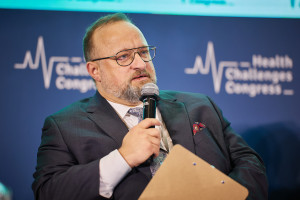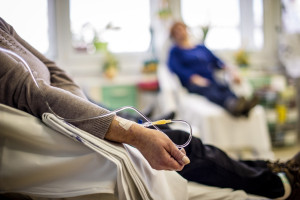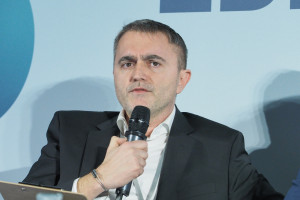Prescription Drugs: A U-Turn? "Ready for a Complete System Turnaround"

- The discussion regarding the financing model and systemic capacity must be much broader. Everyone must be ready for it, because it means a complete reversal of the system that currently operates and that has been accepted for the past several decades," emphasizes Mateusz Oczkowski, Deputy Director of the Department of Drug Policy and Pharmacy at the Ministry of Health.
- He gave an example of a financing model that was adopted several decades ago: - This model is based on the principle that each healthcare provider must assume their own money for treating a patient and then wait for payment.
- The opposite of this model could be central orders for the entire country for medicines taken on commission with delayed payments.
- The director also highlighted the problem of patient medication storage. The National Health Fund (NFZ) pays for these medications, but for various reasons, they are wasted.
- He emphasized that he is also in favor of informing patients how much their treatment costs.
- Another problem that is caused by the storage of medicines by patients is the freezing of the National Health Fund (NFZ) funds for reimbursement, which blocks their spending on current needs.
- - When we improve the issue of distribution to patients in the most important categories of accessibility, the financial possibilities of the public payer will improve - said Director Oczkowski
Healthcare policy is primarily lacking in policy. And it's not about party or political influence on decisions, but rather a lack of strategy. Will the recent change in the position of Minister of Health change this? Time will tell whether a hospital management specialist will be a suitable partner for hospital directors.
The Prime Minister announces the depoliticization of the Ministry of Health and its substantive reforms. Big words and grandiose announcements are made in front of cameras, and the message is being widely shared worldwide.
This kind of substantive approach has been taking place for years, step by step – and not in the spotlight – in the pharmaceutical sector. Recent years have seen a well-thought-out, more transparent, predictable, and open policy, originating from Długa Street, where officials from the Pharmaceutical Department work. It's a mere 450 meters from the ministry's headquarters on Miodowa Street. Small improvements, simplifications, and tools for more rational spending of public funds are being implemented there. Success can be measured by the number of awards from patient organizations for the leaders of these changes. The shelves are bursting beneath them.
From time to time, there are also ideas thrown around at conferences or meetings, which are a voice crying out in the wilderness about the need for a deeper reform of the system, because the one created several decades ago, in completely different realities, requires broad discussion and radical change.
Everyone's responsibility for our moneyAnother opportunity to present ideas for drug policy came during a discussion in the Parliamentary Health Committee on drug programs and the so-called fourth category of accessibility. In an effort to facilitate access for patients, physicians, and healthcare facilities, the Ministry of Health is proposing a new solution.
Some medications that were previously only available in inpatient settings would be optionally available in Outpatient Specialist Care, with the option for the patient to collect the therapy from a public pharmacy.
We wrote more about the rules in the article: They will be available for pickup at the pharmacy. A revolution for doctors and patients.
Among the various proposals, one assumes dispensing medications to the patient for home use for a maximum of one month of therapy. This provides greater control over adherence, protects against medication waste, and also forces consideration of the payer's budget, to which we all contribute.
Apart from the situation when during the therapy period the patient experiences disease progression or side effects of the drug and does not continue taking it, the National Health Fund's losses on drugs issued for a longer period are generated by careless patients in various ways.
Medicines on Allegro or OLX"When giving a patient a back-up medication, we must choose one who is aware of their treatment and will take it regularly. A patient who experiences progression unrelated to medication use, but rather to skipping doses or not taking it, generates increasingly higher costs. A patient entering subsequent treatment lines represents an increasingly higher cost," said the deputy director of the Department of Drug Policy and Pharmacy at the Ministry of Health, adding that this is a challenge for the ministry.
In his opinion, a responsible patient is one who is subject to the medication program and regularly attends the center. The idea of confirming that the patient has actually taken the medication is worth considering. This could involve requiring the patient to bring used pre-filled syringes or pens to the center as evidence:
" This is a very strict requirement, but at least it guarantees adherence. Furthermore, national consultants tell us that some patients are very conscious of the cost of a single pack of the medication they take. For example, if a treatment cycle involves administering four packs, patients use three packs themselves during that period and sell the fourth online. Consultants have sometimes found the medications they prescribe on Allegro or OLX. If a pack of medication costs 40,000 złoty, even if the patient sells it for half the price, they still generate a significant income."
Therefore, not every patient will qualify for the proposed model. The key words are, above all, responsibility and training. Because every taxpayer will foot the bill for a patient's carelessness.
Let's be aware of how much "free" treatment costsThe director is generally in favor of informing patients about the cost of a given treatment. Currently, such information is available in the IKP. However, considering that half of patients—even in drug programs—are over 65, access to the IKP presents a technological barrier. Such information about the drug's cost should be provided at the time of dispensing, ensuring that the patient is aware of it.
Greater awareness of medications that are, in colloquial terms, "free" would also be helpful. We can start by noting that they are provided free of charge to patients, but we all pay for them, and not a little.
Initially, a list of free medications was created for seniors over 75. Later, the group of beneficiaries was gradually expanded to include seniors 65 and older, children and adolescents up to 18 years of age, and pregnant women.
- According to the National Health Fund's draft financial plan for 2026, the amount of money allocated to financing medications for people aged 65+ and 18- is estimated at over PLN 3.5 billion. This represents approximately 1.62% of the Fund's costs.
- For comparison, in 2023 it was less than PLN 1.4 billion. We will spend approximately PLN 40 million on free medications for pregnant women, almost four times more than in 2023 (PLN 11 million).
Manage various risks well- When it comes to providing free medicines or any services for free, everything that is free, unfortunately, I am convinced that it is not fully respected - admitted Director Oczkowski.
Free medicines are additionally correlated with the phenomenon of issuing medicines for 6 months, and in pharmacies for a year, in the form of a prescription for 365 days.
The annual prescription – in the director’s opinion – may have been justified in a situation where the patient was associated with one pharmacy and could not continue to have it filled at another facility.
" When we manage to 'untether' a patient from a given pharmacy, then a patient experiencing product availability issues will be able to fill a prescription for a given item at any pharmacy in Poland . A 365-day prescription for treatment that must be filled immediately or even at intervals doesn't necessarily make sense. We are currently working on a prescription law that will address this situation," Oczkowski said.
He emphasized that we need to start managing various risks effectively: "On the one hand, we're causing financial problems for the payer by allowing medication hoarding. This 'hoarding' applies to medications available to patients both through drug programs and those purchased at pharmacies. Patients don't need a year's supply of medications, just as they don't stockpile food for the entire year."
Central tenders for medicinesMeanwhile, we've allowed this to happen with medicines. Funds are frozen, preventing them from being spent on current needs.
"When we streamline distribution to patients in key accessibility categories, the financial capacity of the public payer will improve. This is beyond the model of drug financing across the entire healthcare system in Poland, which was adopted decades ago. This model requires each healthcare provider to assume their own funds for a patient's treatment and then wait for payment," said the deputy head of DPLiF.
He added that the opposite of this model could be centralized procurement for the entire country for medications purchased on consignment, with delayed payment. Currently, this is not possible due to specific provisions of the Public Procurement Law.
" In Poland, these regulations are quite strict, based on the principle that one supplier wins . If only one competitor wins in the field of medicines, we will have real problems with availability, because everyone will withdraw from our market. We should look for solutions that allow central tenders and the taking of medicines on commission, but with the option of multiple entities winning," said the director, pointing to the Spanish model:
"For example, four competitors win the tender, with varying percentages of their products. The benefits are numerous: we remain competitive, generate savings, and can distribute the drug centrally."
"Therefore, the discussion regarding the financing model and systemic capacity must be much broader. Everyone must be ready for it, because it means a complete reversal of the system that currently operates and that has been allowed for the past several decades, " he emphasized.
Copyrighted material - reprint rules are specified in the regulations .
rynekzdrowia













-%2520CookUnity%2520Prepared%2520Meals.png&w=3840&q=100)
